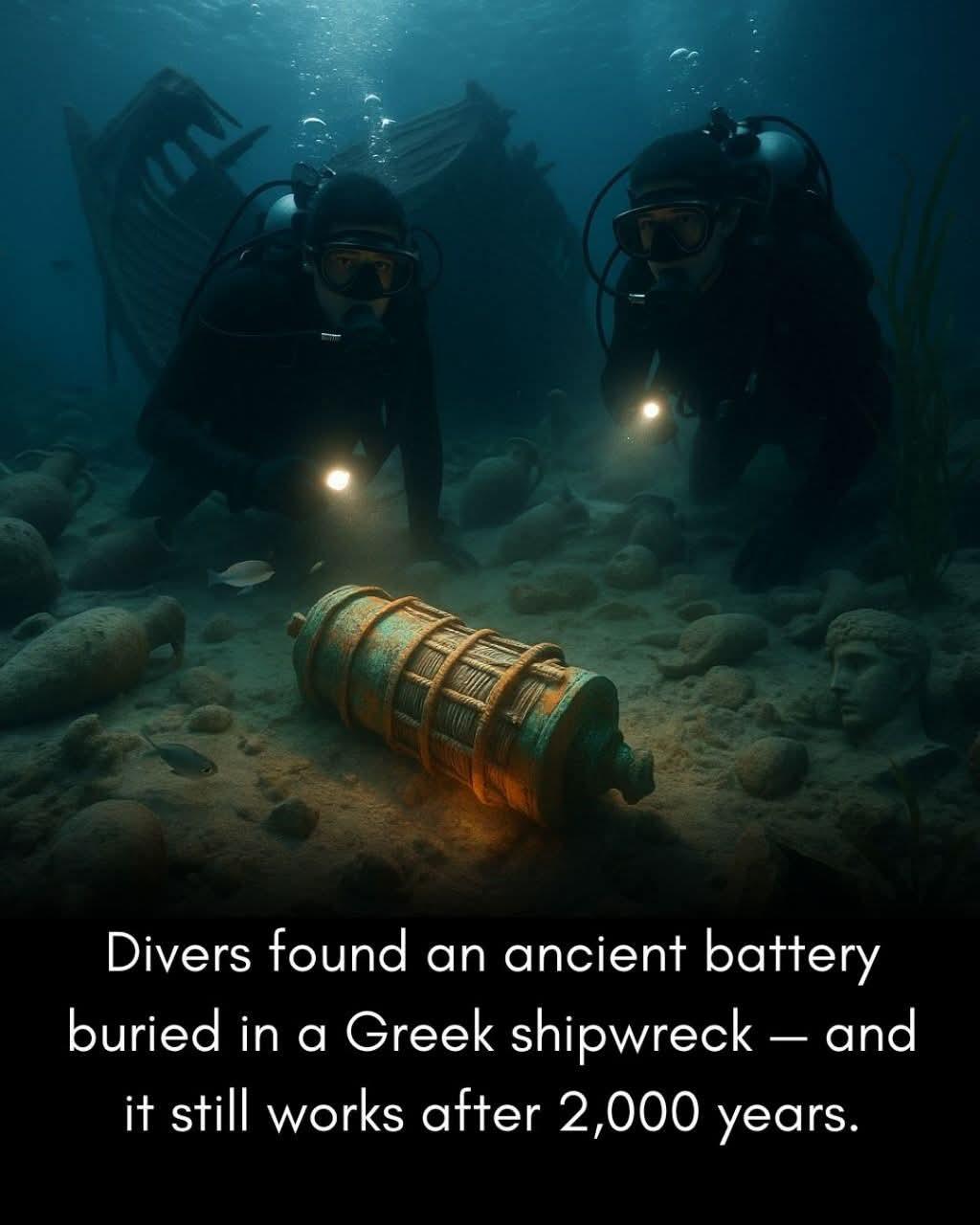A forgotten shipwreck just changed everything we thought we knew about ancient electricity.
Off the coast of Greece, 40 meters beneath the Aegean Sea, divers uncovered what appeared to be just another broken ship lost to time. Wooden beams, bronze statues, shattered amphorae. But hidden beneath a collapsed cargo hold, something extraordinary waited — a sealed copper cylinder with two iron rods inside, wrapped in ancient papyrus.
At first, archaeologists dismissed it. Just debris. But when the object was tested, it sparked — literally. Traces of acid residue were found inside, along with signs of corrosion identical to what we see in modern batteries. It was nearly identical to the mysterious “Baghdad Battery” — but far older.
Carbon dating placed it around 160 B.C., and experts now believe the ship was carrying experimental electrochemical devices. It wasn’t just trade goods and wine jars. It was ancient energy.
But here’s what made scientists pause: A nearby Greek tablet described a “light without fire” used to read maps in dark cargo spaces. It suggests sailors may have used low-voltage lighting — powered by these primitive batteries — centuries before electricity was “discovered.”
The implications are massive. It means our ancestors may have understood electrochemical reactions well enough to use them in real-world tasks. Not magic. Not myth. Just forgotten science, buried in saltwater and silence.
Off the coast of Greece, 40 meters beneath the Aegean Sea, divers uncovered what appeared to be just another broken ship lost to time. Wooden beams, bronze statues, shattered amphorae. But hidden beneath a collapsed cargo hold, something extraordinary waited — a sealed copper cylinder with two iron rods inside, wrapped in ancient papyrus.
At first, archaeologists dismissed it. Just debris. But when the object was tested, it sparked — literally. Traces of acid residue were found inside, along with signs of corrosion identical to what we see in modern batteries. It was nearly identical to the mysterious “Baghdad Battery” — but far older.
Carbon dating placed it around 160 B.C., and experts now believe the ship was carrying experimental electrochemical devices. It wasn’t just trade goods and wine jars. It was ancient energy.
But here’s what made scientists pause: A nearby Greek tablet described a “light without fire” used to read maps in dark cargo spaces. It suggests sailors may have used low-voltage lighting — powered by these primitive batteries — centuries before electricity was “discovered.”
The implications are massive. It means our ancestors may have understood electrochemical reactions well enough to use them in real-world tasks. Not magic. Not myth. Just forgotten science, buried in saltwater and silence.
A forgotten shipwreck just changed everything we thought we knew about ancient electricity.
Off the coast of Greece, 40 meters beneath the Aegean Sea, divers uncovered what appeared to be just another broken ship lost to time. Wooden beams, bronze statues, shattered amphorae. But hidden beneath a collapsed cargo hold, something extraordinary waited — a sealed copper cylinder with two iron rods inside, wrapped in ancient papyrus.
At first, archaeologists dismissed it. Just debris. But when the object was tested, it sparked — literally. Traces of acid residue were found inside, along with signs of corrosion identical to what we see in modern batteries. It was nearly identical to the mysterious “Baghdad Battery” — but far older.
Carbon dating placed it around 160 B.C., and experts now believe the ship was carrying experimental electrochemical devices. It wasn’t just trade goods and wine jars. It was ancient energy.
But here’s what made scientists pause: A nearby Greek tablet described a “light without fire” used to read maps in dark cargo spaces. It suggests sailors may have used low-voltage lighting — powered by these primitive batteries — centuries before electricity was “discovered.”
The implications are massive. It means our ancestors may have understood electrochemical reactions well enough to use them in real-world tasks. Not magic. Not myth. Just forgotten science, buried in saltwater and silence.




